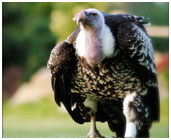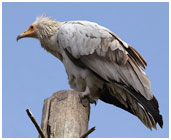Vulture is a scavenging bird that is found inhabiting almost all the countries of the world. To know more about vultures, read the interesting fact & amazing information given here.
Facts About Vulture
Vulture is the name of a bird that mainly preys on dead animals and occasionally hunts its own quarry. It is found across the world, with the exception of Antarctica and Oceania. Vultures are basically divided into two groups, namely Old World vultures and New World vultures. The former belong to the family Accipitridae and are found inhabiting Africa, Asia and Europe. The latter, on the other hand, belong to the family Cathartidae and are mainly seen in the warm and temperate areas of the Americas. In case you want to know more about the bird, read the interesting as well as amazing information provided in the following lines. 

Facts about Vulture
Kingdom: Animalia
Phylum: Chordata
Class: Aves
Orders: Falconiformes and Ciconiiformes
Size: 60 to 140 cm (24 to 55 inches)
Species: Around 20
Wingspan: Up to 3 m (10 feet)
Weight: Up to 12 kg (25 lb.)
Diet: Carrion (animal carcasses)
Natural Habitat: Throughout the world, except the continents of Antarctica and Oceania
Age: 15 to 20 years
Age of Maturity: 5 to 7 years
Number of Eggs: One
Interesting & Amazing Information on Vultures
- The projectile vomit of a vulture, followed by the action of flying away, is its most common defensive tactic, against an adversary.
- Vultures can eat as well as digest meat, in any stage of decay. They can even endure diseases that would kill any other creature.
- Vultures do have the habit of building nests.
- Vultures can fly for hours at a stretch. Since they glide over thermal updrafts, grabbing a free lift, they do not get tired soon.
- Vultures have a very well developed and heightened sense of smell.
- In order to cool themselves as well as a measure of disinfecting their legs, vultures urinate.
- The urine of a vulture can kill any germ that it would have picked while walking through a cadaver.
- Since the head of a vulture is bald, bacteria find it difficult to stick to it. The ones that manage to do it are baked off by the vulture, using sunlight.
- In case a carcass has a very thick hide, which the vulture cannot open, it waits for a larger scavenger to eat first.
- Vultures usually have only one mate in a year.
- A female vulture lays eggs in a nest, made of sticks and leaves and built in trees and cliffs. The same nest might be used for a number of years.
- Vultures can completely eat the flesh of a small animal in less than half an hour.
- A group of vultures is known as a venue and when the group is seen in the air, circling together, it is called a kettle.
- Some of the vultures also eat bones, along with the flesh.
- Vultures have very sharp eyesight and on the open plains, they can spot a three-foot carcass even from four miles away.
- The turkey vulture is gentle and non-aggressive.
- Vultures circle in order to gain height as well as to search for food.
- Vultures have poor vision in the dark.
- Vultures have the same ancestor as storks.


See also
More from iloveindia.com
- Home Remedies | Ayurveda | Vastu | Yoga | Feng Shui | Tattoos | Fitness | Garden | Nutrition | Parenting | Bikes | Cars | Baby Care | Indian Weddings | Festivals | Party ideas | Horoscope 2015 | Pets | Finance | Figures of Speech | Hotels in India : Delhi | Hyderabad | Chennai | Mumbai | Kolkata | Bangalore | Ahmedabad | Jaipur
- Contact Us Careers Disclaimer Privacy Policy Advertise With Us Lifestyle Sitemap Copyright iloveindia.com. All Rights Reserved.




